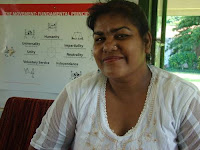 WHEN a person has been blessed with special talents, enabling them to do wonders with their hands, they should not neglect that, says masi maker Mere Sagaitu.
WHEN a person has been blessed with special talents, enabling them to do wonders with their hands, they should not neglect that, says masi maker Mere Sagaitu.She believes if anyone was blessed with special talents they should put it to good use otherwise that talent will be taken away from them.
"Everyone has been blessed with a talent and they should put it to good use and not sit idle if they do not have any form of employment to either support themselves or their families," she said.
In Mere's case, masi making has always been in her family genes and her one passion in life.
The mother of three hails from Ekubu, Vatulele, while her husband Petero Sagaitu, hails from Sawaieke, on Gau.
Mere, as she prefers to be called, recalled her days as a young girl on Vatulele when she used to help her grandmothers prepare the inner bark of the mulberry tree for the masi.
She said as she got older she went on to complete her secondary education at Dudley in Suva after completing her primary years on the island of Vatulele.
"After I finished high school I stayed at home with my parents in Sigatoka before deciding what I was going to do with my life," she said. I learnt masi making through my grandmothers when I was growing up in Vatulele.
"This skill or talent as one may call it has remained with me because any free time I had, I used to try it out."
Mere said she loved masi making and would not swap it for anything else.
She said the inspiration for her to start her own business came about after she got married.
She said at the time she decided to start her own business, her husband who was a miner with the Emperor Gold Mines in Vatukoula, was one of the few who had opted to take the package back in 1991.
"Looking back, I can say the journey has been a long one," she said.
"My husband and I had decided to start our own masi making business for ceremonies like weddings or house decoration."
Mere said since starting out the business, orders have been coming in from major tourist shopping outlets.
She said she has also employed other women in the area to help beat the mulberry bark to prepare the masi.
She said although it was a tiring job the returns were worthwhile.
She said the pieces range from wedding suits, to birthday outfits with prices to match.
"It's going to be an even longer one now that I have actually gone into selling my masi," she said.
Mere said the other positive thing to have come about from starting her own business was that she now teaches masi making to students who visit her requesting to learn.
She said by entering the masi making business she has been able to also meet up with her business contacts.
"Last year during the Christmas art display in Suva I was approached by the Pacific Cultural Centre in Hawaii to do some masi work for them," she said.
Adapted from Fijitimes Online













